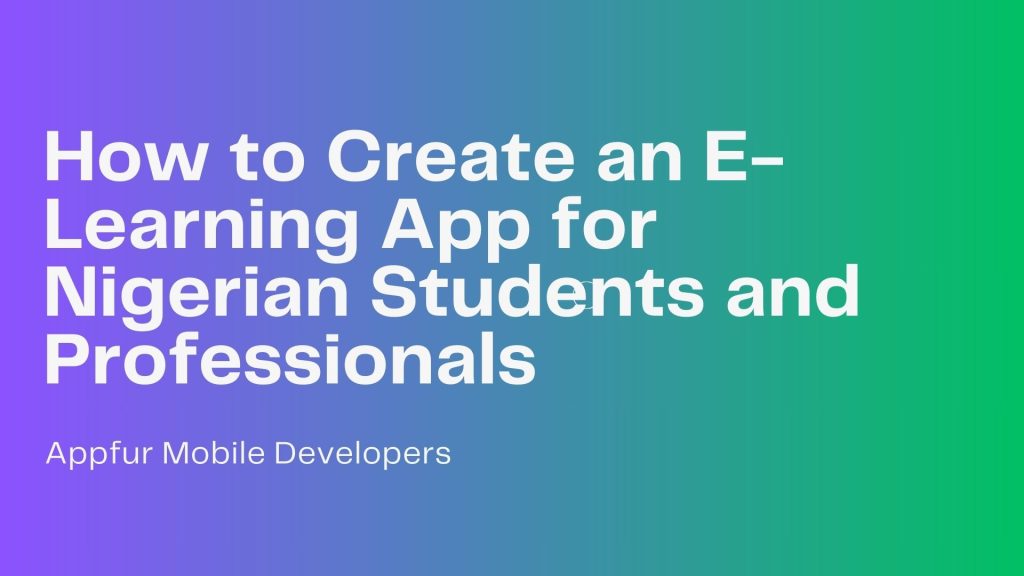Did you know that Nigeria has over 100 million young people under the age of 30, many of whom are actively seeking knowledge outside traditional classrooms? From JAMB prep to tech skills and professional certifications, e-learning has become a powerful solution to Nigeria’s education challenges — and it’s a booming opportunity for tech founders.
If you’re planning to build an e-learning app for Nigerian users, this detailed guide will show you how to develop a solution that works, scales, and makes real impact.

Step 1: Define Your Audience and Learning Focus
Start by clearly defining who your e-learning app is for:
- Primary or Secondary school students?
- University undergraduates?
- Professionals looking for certification?
- Tech enthusiasts learning coding or design?
- Artisans and blue-collar workers needing practical training?
Nigeria’s learning gaps are wide — don’t try to solve everything at once. Focus on one clear problem, one audience, and one style of delivery (e.g., video, text-based, quizzes).
Popular niches include:
- WAEC, NECO, JAMB prep
- Tech upskilling (Flutter, Python, UI/UX)
- Language learning (French, Yoruba, Igbo)
- Career-focused courses (HR, Marketing, Finance)
- Faith-based or lifestyle training
Step 2: Must-Have Features for an Effective Nigerian E-Learning App
Your e-learning app should include:
- Student Registration/Login (via email or phone number)
- Course Library with filters (by topic, duration, level)
- Video Lessons, downloadable or streamable
- PDF Notes & Quizzes
- Progress Tracking & Certificates
- Live Class Integration (Zoom, Jitsi, or native)
- Gamification (points, badges, leaderboards)
- Push Notifications for reminders and updates
To increase adoption:
- Include offline learning options
- Support low-bandwidth video formats
- Add course completion certificates to encourage retention
For admin and tutors:
- Upload and manage course content
- Track learner analytics
- Communicate with students
- Run promotions or discounts
Step 3: Build Using the Right Technologies
A successful e-learning app must be fast, secure, and scale-ready.
Recommended tech stack:
- Flutter for cross-platform mobile apps
- Node.js or Django for backend API
- Firebase or Supabase for user authentication and real-time updates
- Cloudinary or AWS S3 for hosting video and files
- Razorpay, Paystack, or Flutterwave for payments
- Stripe or PayPal for international course buyers
Consider a progressive web app (PWA) version for students with limited phone storage.
Step 4: Price It Right for Nigeria
Affordability matters. You can monetize your app in any of the following ways:
- Freemium model: Some free courses, others paid
- Pay-per-course: Once-off payment for access
- Subscription: Monthly access to entire library
- Partnerships with schools, churches, or businesses
- Certificate upgrades for a small fee
Also, give room for scholarships or promo codes to drive initial user adoption.
Step 5: Localize Your Content and Experience
If your app feels foreign, users will lose interest. Tailor the app to Nigeria by:
- Using local examples and scenarios in lessons
- Supporting local languages or Pidgin where necessary
- Featuring Nigerian tutors and role models
- Offering content relevant to the Nigerian job market
- Aligning with local school curricula where needed
Localization builds trust — and boosts engagement.
Step 6: Launch and Drive Adoption
For initial traction:
- Launch on university campuses or via church youth groups
- Partner with popular tutors or educators on social media
- Use TikTok and WhatsApp to showcase course highlights
- Offer a free introductory course
- Create a community via Telegram or Discord for students
Test early with a small group, refine your UX based on feedback, then scale gradually to reach wider users.
Step 7: Support, Retention, and Scaling
Don’t just sell courses — build a learning experience:
- Offer weekly email summaries of learner progress
- Send daily push reminders for incomplete courses
- Enable peer learning or discussion forums
- Gather feedback and update course content regularly
- Explore partnerships with universities, government bodies, or NGOs for broader impact
Final Thoughts
In a country where quality education is limited by infrastructure, cost, and distance, your app could change lives. But it must be accessible, engaging, and relevant to how Nigerians learn and live.
At Appfur Nigeria, we specialize in building powerful e-learning platforms customized for the local market. Whether it’s for schools, professionals, or public training projects, we’ll help you bring your vision to life — the smart way.
We design and build high-quality, scalable mobile apps tailored to your needs.
Let’s talk! Message us on WhatsApp now: Click Here
Your next big app starts here!
